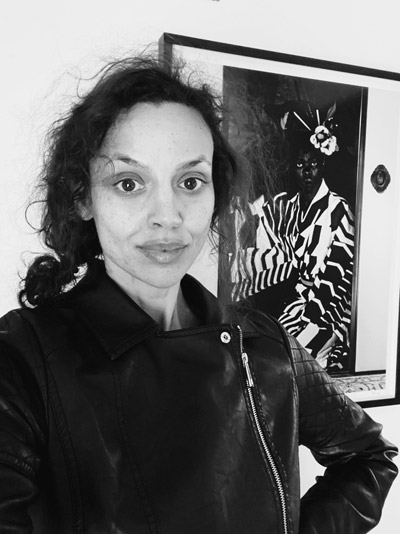For Autograph’s project Care | Contagion | Community — Self & Other, we commissioned ten UK-based visual artists to create new bodies of work in response to the wider context of the global pandemic. We then invited ten writers – each paired with one of the artists – to produce a short reflective essay contextualising the new artworks made.
For her artist commission, Lori produced two film works entitled The Lines Between Us and I, Becoming You that explore the artist’s relationship with her father through the prism of their shared lineage of philosophy books. Taking Brazilian theorist Paulo Freire’s seminal book Pedagogy of the Oppressed (1968) as a point of departure, the two interconnected multi-screen moving image works address complex themes ranging from family, culture, diaspora to politics of identity, gender, class, privilege and education.
Below, curator Renée Mussai, who has been in dialogue with the artist throughout the commissioning process, reviews Ope Lori’s transgressive double performance – as father, and daughter – in these works, considering the films’ multiple discursive dimensions in the context of Freire’s conception of changing human consciousness, dialogical action and performative re-enactments.

Renée Mussai is a London-based curator and scholar with a special interest in African and diasporic lens-based visual arts practices. She is Senior Curator and Head of Curatorial & Collection at Autograph, where she has worked for almost two decades, advocating for a diverse constituency of contemporary artists and co-commissioning a range of artistic programmes.
She lectures regularly on photography, visual culture, and curatorial activism and her art writing has been published in several monographs and anthologies including by TATE, Aperture, and NkA. Mussai is also Research Associate at the Visual Identities in Art and Design Research Centre, University of Johannesburg; Associate Lecturer at University of the Arts London, and regular guest curator and former Fellow at the Hutchins Centre for African & African American Research at Harvard University.
See the full artist commission by Ope Lori
Read Notions of Becoming, a conversation between Lori and filmmaker Campbell X
Renée Mussai introduces the new artist commissions in a curatorial essay One (Pandemic) Year On...
Read the introduction to the Care | Contagion | Community project
Visit the Care | Contagion | Community — Self & Other exhibition at Autograph's gallery
Can you spare a few moments? Autograph is carrying out a survey to better understand who our digital audiences are. The survey should take no longer than five minutes to complete. Anything you tell us will be kept confidential, is anonymous and will only be used for research purposes.
The information you provide will be held by Autograph and The Audience Agency, who are running the survey on our behalf. In compliance with GDPR, your data will be stored securely and will only be used for the purposes it was given.
You can take the survey here. Thank you!

Images: from Ope Lori's commission, The Lines Between Us / I, Becoming You, 2020. Film, © and courtesy the artist, commissioned by Autograph for Care | Contagion | Community – Self & Other: 1 [detail] and 2) Film stills from The Lines Between Us, 2020. Film, 16' 11".
3) Renée Mussai, with Zaki by Zanele Muholi, 2021. Courtesy Renée Mussai.

Autograph is a place to see things differently. Since 1988, we have championed photography that explores issues of race, identity, representation, human rights and social justice, sharing how photographs reflect lived experiences and shape our understanding of ourselves and others.